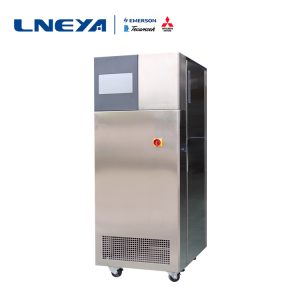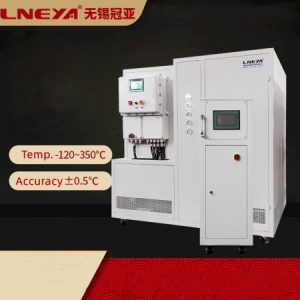What should I pay attention to when choosing an evaporator for an ultra-low temperature chiller?
The evaporator in the ultra-low temperature chiller is one of its four major components, so performance is more important.
The selection of ultra-low temperature chillers needs to pay attention to the influence of liquid level on the evaporation temperature. Due to the influence of the height of the refrigerant liquid column, the evaporation temperature at the bottom of the flooded evaporator is higher than the evaporation temperature of the liquid surface. The evaporation temperature of different refrigerants at different liquid levels is affected differently by the height of the static liquid. Regardless of the refrigerant, the lower the evaporation temperature of the liquid surface, the greater the influence of the hydrostatic height on the evaporation temperature. Therefore, only when the evaporation pressure is high, the influence of the hydrostatic height on the evaporation temperature can be ignored. When the evaporation temperature is low, it cannot be ignored. In other words, it becomes uneconomical to use a flooded evaporator at this time.

If the evaporation temperature is lower than the freezing temperature of the refrigerant, the refrigerant may freeze. In the subsequent flow of the refrigerant, the temperature of the refrigerant is low, and the possibility of freezing is high. When water is used as the refrigerant, theoretically, the temperature of the inner wall of the tube can be as low as 0°C. However, for safety reasons, the temperature of the inner wall of the pipe at the outlet end of the next process is usually kept above 0.5°C. In the case of brine as the refrigerant, according to the same principle, the temperature of the inner wall of the tube should be higher than the freezing temperature of the refrigerant by more than 1°C.
When the refrigerant flows through the evaporator, pressure loss is caused, which will inevitably make the pressure p2 of the refrigerant at the outlet of the evaporator be lower than the pressure p1 at the inlet, thereby reducing the suction pressure of the compressor, resulting in a decline in the refrigeration capacity.
According to different models, the choice of evaporator is different. For example, the box-type small ultra-low temperature chiller uses a water tank coil type evaporator; the open-type small ultra-low temperature chiller and the screw-type small ultra-low temperature chiller use shell and tube Type evaporator; for acid and alkali resistant ultra-low temperature chillers, you can choose titanium tube evaporator or stainless steel plate exchanger; there are many options, of course, it can be customized according to user needs.
The ultra-low temperature chiller evaporator is generally designed and equipped by the ultra-low temperature freezing test manufacturer. It is recommended that users check the configuration problems when choosing the ultra-low temperature chiller manufacturer.
Recomendações relacionadas
-
Como lidar com a fraca dissipação dos chillers de baixa temperatura
1198Low temp chiller products contribute a lot to various industrial production, and at the same time, help to improve the labor efficiency of industrial production. With the development of China's economy and the improvement of production process req...
Ver pormenores -
Instruções de deteção de falhas do compressor do termóstato de aquecimento e arrefecimento com semicondutores
779In the semiconductor heating and cooling thermostat, the compressor is one of its core components. Once it fails, it will affect the operation of the whole system. How to solve the fault is better? The faults of semiconductor heating and cooling t...
Ver pormenores -
LNEYA microfluidic chip test solution
1087The microfluidic chip test is a program for testing the drive control chip. The LNEYA microfluidic chip test device specializes in processing various chip tests, and has certain advantages for the development of the chip environment. In order to i...
Ver pormenores -
How do isolated heating refrigeration circulators deal with inefficiencies?
944Heat dissipation is a common problem that causes inefficiencies in isolated heating refrigeration circulators, and it is also a problem that can easily occur. Many isolated heating and refrigeration circulators will have similar problems, so how t...
Ver pormenores
 LNEYA Refrigeradores industriais Fabricante Fornecedor
LNEYA Refrigeradores industriais Fabricante Fornecedor













